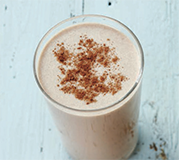
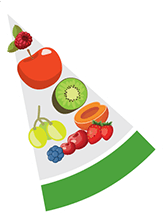
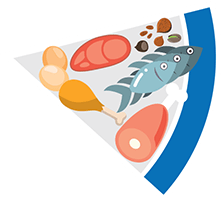
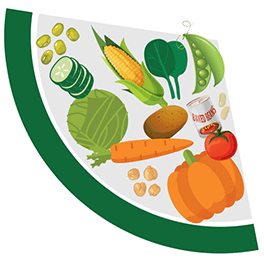
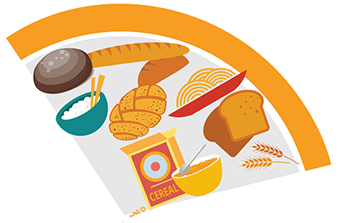
Close
DAIRY
A 4-8 year old child should consume 1 1/2 to 2 serves of dairy including milk, yoghurt and cheese and/or alternatives every day as part of a healthy diet.
Close
GRAINS
A 4-8 year old child should eat 4 serves of grain (cereal) foods, mostly wholegrain and/or high cereal fibre variety foods every day as part of a healthy diet.
Close
MEAT
A 4-8 year old child should eat 1 1/2 serves of lean meat and poultry, fish, eggs and - or alternative foods every day as part of a healthy diet.
Close
FRUIT
A 4-8 year old child should eat 1 1/2 serves of fruit every day as part of a healthy diet.
Close
VEGETABLES
A 4-8 year old child should consume 4 1/2 serves of vegetables and legumes every day as part of a healthy diet.
Close

CHEESE
- Cheese contains many of the nutrients found in milk, because it is made from milk.
- There are over 100 different types of cheese made in Australia and each has a special recipe. The most popular cheese in Australia is cheddar cheese.
- 2 slices of cheese is equivalent to one serve of dairy

Close

CHEESE
- Cheese contains many of the nutrients found in milk, because it is made from milk.
- There are over 100 different types of cheese made in Australia and each has a special recipe. The most popular cheese in Australia is cheddar cheese.
- 2 slices of cheese is equivalent to one serve of dairy

Close

MILK
- Many people know that milk is high in calcium, which is important for building and maintaining strong bones.
- However, calcium is just one of the many nutrients found in milk. Milk naturally provides more than ten essential nutrients including calcium, vitamin A, vitamin B12, iodine, riboflavin, potassium, magnesium, zinc, phosphorus, carbohydrate and high quality protein
- 1 cup of milk is equivalent to one serve of dairy.

Close

MILK
- Many people know that milk is high in calcium, which is important for building and maintaining strong bones.
- However, calcium is just one of the many nutrients found in milk. Milk naturally provides more than ten essential nutrients including calcium, vitamin A, vitamin B12, iodine, riboflavin, potassium, magnesium, zinc, phosphorus, carbohydrate and high quality protein
- 1 cup of milk is equivalent to one serve of dairy.

Close

MILK
- Many people know that milk is high in calcium, which is important for building and maintaining strong bones.
- However, calcium is just one of the many nutrients found in milk. Milk naturally provides more than ten essential nutrients including calcium, vitamin A, vitamin B12, iodine, riboflavin, potassium, magnesium, zinc, phosphorus, carbohydrate and high quality protein
- 1 cup of milk is equivalent to one serve of dairy.

Close

YOGHURT
- Regarded as the world's first 'health food', yogurt has been consumed by humans for centuries. Ancient cultures originally used it as a way to preserve the goodness of milk. Today it is enjoyed as the perfect snack straight from the tub or used in dips, sauces, marinades and desserts.
- Yogurt is a rich source of calcium and contains over ten essential nutrients including protein, Vitamin A, Vitamin B12 and Riboflavin.

